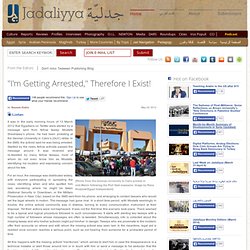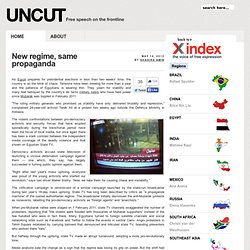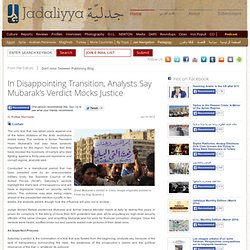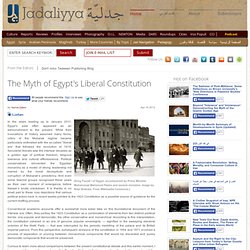

The Muslim Brotherhood/Sectarian Issues. Jadaliyya. Egypt's Emergent Passive Revolution. ''I'm Getting Arrested,'' Therefore I Exist! It was in the early morning hours of 13 March 2012 that Egyptians on Twitter were alerted by a message sent from fellow tweep Mostafa Sheshtawy’s phone.

He had been picketing at the German University in Cairo’s (GUC) strike. In the SMS, the activist said he was being arrested. Startled by the news, fellow activists passed the message around. It was received and re-tweeted by many fellow tweeps, most of whom do not even know him as Mostafa, identifying his location and expressing concern about his fate. For an hour, the message was distributed widely, with everyone participating in spreading the news; identifying when and who spotted him last; wondering where he might be taken (National Security in Downtown, or the Military Prosecution in Nasr City), based on the SMS sent from his phone; and arranging to contact lawyers who would set the legal wheels in motion.
For instance, the revolutionaries’ campaigns were more progressive/daring, colorful, and unexpected. The Complicity of Cairo’s Press. A new dawn was heralded following the ouster of Hosni Mubarak, but has anything changed for Egypt’s fourth estate?

Freedom of the press is frequently cited as a just cause for popular protest and an ideal cherished by those attempting to speak truth to power. Egypt’s revolution demanded no less, but are Cairo’s newspapers and media outlets any better off under the Military Council? A protester in Tahrir square holds up a newspaper that declares 'The flower blooms in Egypt', in February 2011 A few days before Christmas last year, and just after another wave of deadly rioting had erupted in Cairo following the first round of parliamentary elections, an Egyptian newspaper ran a front page splash that was as impressive as anything produced recently by a major Western publication.
Behind a stark red, two-inch high headline shouting “Liars” was an enormous photo showing Egyptian military police assaulting a helpless girl. New regime, same propaganda. May 14, 2012 by Shahira Amin As Egypt prepares for presidential elections in less than two weeks’ time, the country is on the brink of chaos.

Tensions have been brewing for more than a year and the patience of Egyptians is wearing thin. They yearn for stability and many feel betrayed by the country’s de facto military rulers who have held power since Mubarak was toppled in February 2011. “The ruling military generals who promised us stability have only delivered brutality and repression,” complained 24-year-old activist Tarek Ali at a protest two weeks ago outside the Defence Ministry in Abbasia. Ghosts of Conflicts Past. Egypt Unwrapped As Egyptians celebrate their own battle for democracy, another bygone conflict slides deeper into history.

Cairo War Memorial Cemetery Deep in the heart of Cairo’s Heliopolis, an old colonial suburb of sugar loaf domes and neo-Arabian town houses, is an oasis of calm inhabited only by the dead.. “Here lies H.E Fisher, former private in the East Kent Regiment.” He died on June 14, 1943, at the age of 29. “To all the world just a man,” reads the inscription on his bone-white tomb. All in all there are 1,830 bodies lying beneath the clipped, green turf of the Heliopolis War Cemetery – the vast majority killed by illness or accidents, according to a regional manager for the Commonwealth War Graves Commission, Andrew Fretwell.
In Disappointing Transition, Analysts Say Mubarak's Verdict Mocks Justice. The only trial that has taken place against one of the fallen dictators of the Arab revolutions ended today.

The Pharaoh's Legacy - By Steven A. Cook. Hosni Mubarak is dead, or very close to it.

The Egyptian state news agency MENA reported that the former president was pronounced clinically dead after having a stroke on the evening of June 19 -- a statement that was quickly denied by a member of the ruling military junta, who clarified that Mubarak was nevertheless in critical condition. Whatever the case, Mubarak's final moments in a military hospital in Cairo would not be what many Egyptians had in mind when they sought justice and revenge for those who suffered at his hands. No doubt, his supporters would have preferred the pomp and circumstance of a state funeral honoring a man they believe was a transitional figure who had placed Egypt on the path of prosperity and even democracy.
For better or worse, Mubarak's predecessors, Gamal Abdel Nasser and Anwar Sadat were larger-than-life figures who accomplished big things, whether it was nationalization of the Suez Canal or negotiating peace with Israel. MOHAMMED ABED/AFP/GettyImages. WWII's Explosive Legacy. Egypt Unwrapped This year marks the 70th anniversary of the Battle of El-Alamein.

The Myth of Egypt's Liberal Constitution. In the years leading up to January 2011, Egypt’s past often appeared as an admonishment to the present.

While their invocations of history assumed many forms, critics of the Mubarak regime became particularly enthralled with the so-called “liberal era” that followed the revolution of 1919. Secularist liberals saw the interwar decades as a golden age of political freedom, religious tolerance and cultural efflorescence. Political conservatives reinvented the Egyptian monarchy as a model of strong leadership not marred by the moral decrepitude and corruption of Mubarak’s presidency. And even some Islamist groups recognized these years as their own moment of emergence before Nasser’s brutal crackdown.
It is thanks in no small part to these rosy depictions that various political actors have in recent weeks pointed to the 1923 Constitution as a possible source of guidance for the current drafting process. Egyptian Panel Examines System To Block Online Pornography. Customers use computers at an Internet cafe in Tehran May 9, 2012.

(photo by REUTERS/Raheb Homavandi) Author: Al-Masry Al-Youm (Egypt) Posted May 19, 2012 On May 17 [2012], the Egyptian Parliamentary Commission for Transport and Communications discussed a report prepared by one of its delegations to evaluate the UAE’s system for blocking pornographic sites. Summary⎙ Print An Egyptian parliamentary commission sent delegates to the UAE to evaluate their system for blocking pornography, suggesting that Internet censorship might find its way into law. Mohammad Gharib reports that because Internet blocks are easy to evade, parliament must weigh the pros and cons of enacting such legislation.
Author Mohammad Gharib Posted May 19, 2012. The Regime Strikes Back. Will Egypt’s first free elections be a total sham?

The upcoming parliamentary elections in Egypt are facing the first major obstacles to accomplishing their high aims. The parliamentary vote will hopefully be the first free and fair elections in Egypt since the ousting of former President Hosni Mubarak. Political groups including the Muslim Brotherhood (MB) are threatening to boycott the election—reminiscent of the Ikhwan’s November 2010 boycott, in which they lost the bulk of their representation in parliament—unless a disputed law is amended immediately.
A protester peers through a gash in a poster in Cairo A contested law aims to ensure broader representation in the parliament by restricting large parties like the Muslim Brotherhood to only two thirds of all possible seats and reserving one third for independents. Elections are due to begin on 28 November. Egypt’s future: The generals’ slow and unsteady march to democracy. Egypt's Other Revolution: Modernizing the Military-Industrial Complex. The Egyptian military produces a staggering array of manufactured goods: kitchen cutlery, flat-screen televisions, agricultural and household chemicals, refrigerators, industrial machinery, railway cars, and election booths.
And while many of the military’s factory webpages make a concerted attempt to promote their wares, the careful observer gets the feeling that the production of air conditioners and gas stoves has superseded the production of guns and ammo. Although the military has been co-producing weapons systems in its factories under license from Western arms manufacturers for decades, the production lines and maintenance facilities constructing and modifying American M1A1 tanks, British armored vehicles, French Alpha Jets, and Chinese versions of Soviet MiGs are remnants of agreements originally signed in the mid-1980s and early-1990s, initiated by the now-deceased former Field Marshal (and staunch US ally) Mohamed Abdel Halim Abu Ghazala.
Have Weapons, Will Export. Egypt’s Headless Revolution - Omar Ashour. Exit from comment view mode. Click to hide this space CAIRO – “The man who taught me to sacrifice my heart for Egypt is dead,” said Vivian Magdi, mourning her fiancé. Egypt’s Revolutionary Coup - Shlomo Ben-Ami. Exit from comment view mode. Click to hide this space MADRID – How revolutions unfold depends on many factors, including a country’s socio-economic structure, its particular historical traditions, and sometimes the role of foreign powers. One cheer for the Egyptian elections. The preliminary results of the first round of the elections in Egypt for the new constituent assembly were both predictable and sobering. The strong showing of the Muslim Brotherhood was virtually inevitable.
They've had at least 30 years’ head start on almost everybody else since being in effect decriminalized by Anwar Sadat. SCAF vs. the Street. Apology Not Accepted. On : Thursday, 24 Nov, 2011 Hearts and Minds Field-Marshal Hussein Tantawi. Egypt's Military Learns its Lesson. The second revolution has, supposedly, come to Egypt. The Army and the People Were Never One Hand - By Max Strasser. Pageantry, Military Myths, and Egypt's “Daddy Complex” Call the Generals' Bluff - By Sherif Mansour. On Monday, Feb. 6, the Egyptian Justice Ministry indicted me and 42 other employees from five different NGOs operating in Egypt, referring our cases to the country's criminal court.
They have accused me of being an "American-Egyptian fugitive" and claim I am being charged with "managing a branch of an international organization without a license from the Egyptian government" and "receiving and accepting money from international organizations through direct funding for implementing activities which is forbidden by law and violate the sovereignty of the state. " For the past five years, I have been an employee of Freedom House, managing programs that empower young advocates of democracy and human rights in Egypt and the Middle East. I was born in Egypt, and I started my human rights career working at the Ibn Khaldun Center for Development Studies, Egypt's oldest human rights organization, where I led a national coalition of NGOs to monitor the elections in 2005.
Revolution Revived: Egyptian Diary, Part One. Revolution Revived: Egyptian Diary, Part Two. The Second Republic of Tahrir - By Ashraf Khalil. CAIRO – Tahrir Square is back. For the past four days, protesters opposed to military rule have done battle with Egyptian security forces -- and on Tuesday, Nov. 22, the tide appeared to finally turn in their favor. Buoyed by crowds that exceeded 100,000, the protesters forced the ruling Supreme Council of the Armed Forces (SCAF) to announce an accelerated transition to civilian rule. But with mistrust between the two sides running high, nobody is celebrating just yet. "The Armed Forces do not seek power and are ready to leave power immediately through the holding of a popular referendum if necessary," SCAF chairman Field Marshall Mohamed Tantawi said in a televised address. "Some tried to drag us into confrontation … But we will control ourselves to the maximum.
Nevertheless, the Health Ministry reported that at least 29 people had died during the latest spasm of unrest -- and Egyptians' growing disenchantment with the SCAF has certainly been on full display. Scenes From Egypt's Unfinished Revolution - Alan Taylor - In Focus. It's Still Mubarak's Egypt - By Steven A. Cook. The Egyptian Military Wins Again. Shared Values. Ports of Call. Cracks show in post-revolution Egypt « UNCUT.
Cairo Looks to Islamabad. Is the Egyptian-Israeli Relationship Over? Egyptians v Saudi Arabia: it's all got rather messy. Egypt's Presidential Front Runner Takes a Hard Line on Israel. The New Inquiry - The Revolution That Wasn't. Adam Shatz · Whose Egypt? · LRB 5 January 2012. A World of Possibilities. Mohamed Beltagy, Egypt’s Human Bellwether. Bruised but defiant: Mona Eltahawy on her assault by Egyptian security forces. Victory for women protesters subjected to “virginity tests” Military court hears evidence in Egyptian “virginity tests” case. Egypt: Military Impunity for Violence Against Women. A Milestone for Egypt. Who'd be a Woman in Egypt? Shirin Ebadi: who defines Islam? Ultra Violence - By James M. Dorsey. The Beautiful Game and the Blame Game. Egypt’s Second Half.
The Abbaseya violence and the revolutionary impasse in Egypt. What's Left of Tahrir Today. In Egypt, Lamentations Over a Lost Revolution. Losing Egypt. Egypt: the people demand the downfall of the system. Egyptian Protesters Vow To "Complete the Revolution" What Happened to My Revolution - By Sarah A. Topol. January 25th and the Egypt the Revolution Has Made. Egypt’s Revolutionary Narrative Breaks Down - Lauren E. Bohn. I is for Insurrection. Egypt’s Hijacked Revolution. Four Steps to Save The Egyptian Revolution. The Family That Revolts Together. What do Egypt’s Generals Want? - Omar Ashour. Egypt's generals wait in the wings as the revolution turns messy. Egypt: New Law Keeps Military Trials of Civilians. April 6: Genealogy of a Youth Movement. Bringing the Revolution to Campus: An Interview with March 9 Activist Laila Soueif. This is Not 1954.
The true price of Egypt's freedom - Africa - World. Nile Journey. Recalling the Past: The Battle over History, Collective Memory and Memorialization in Egypt. "Egypt’s Broken Economy" by Mohsin Khan. The Egyptian Revolution and Neo-Liberal Economics (Video) Political Estrangement, Legal Challenges Hamper Labor Movement. "What We Owe Egypt" by Daron Acemoglu and James A Robinson. Egyptian Leaders Fail to Defend Migrant Workers in Saudi Arabia. Egypt's Working Class and the Question of Organization. Egypt’s uncertain road to prosperity: economic challenges to long‐term stability. Entrepreneurs of the revolution: jockeying for livelihood and security in post-Arab Spring Cairo. Credit Egypt.